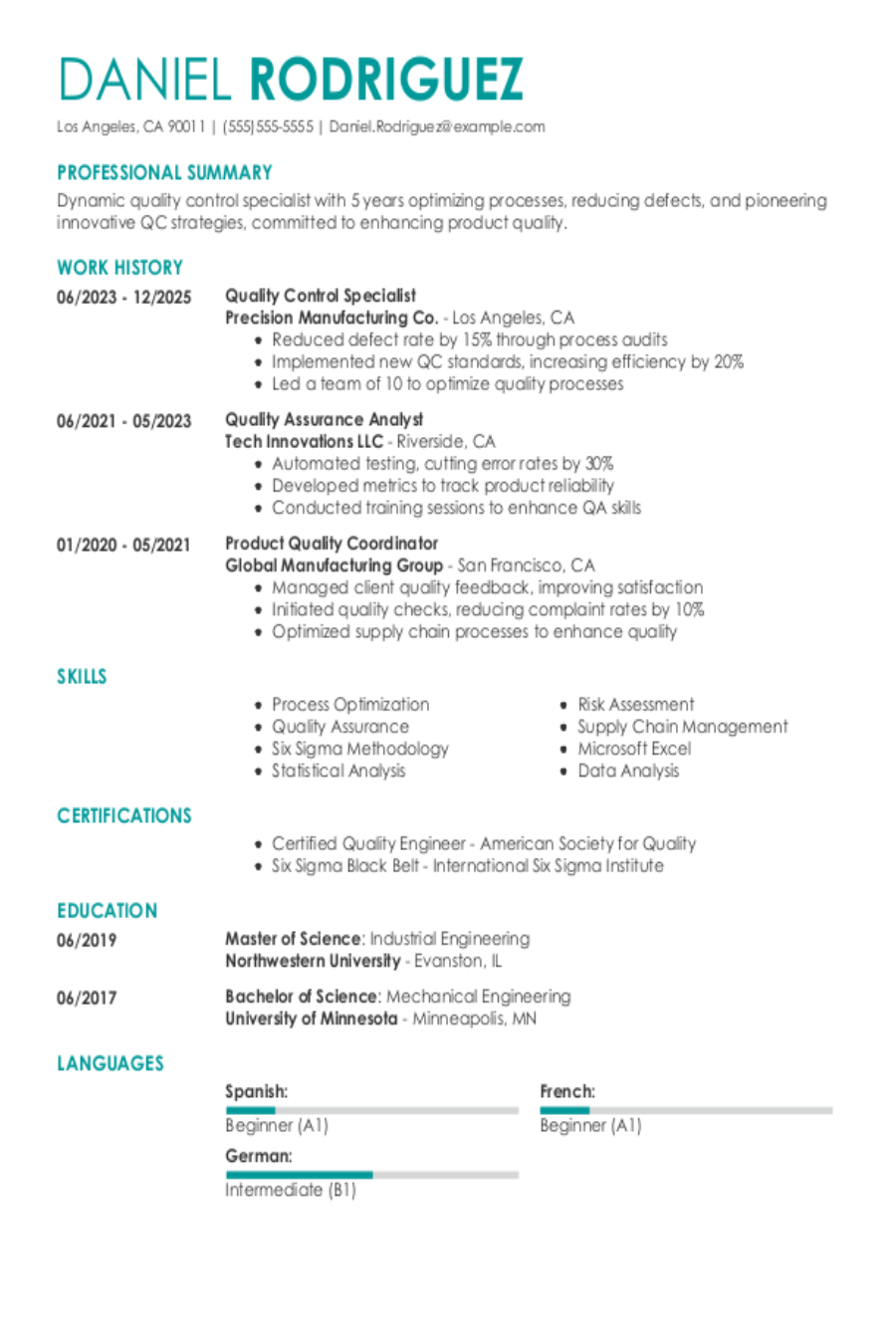Table of contents
Popular Registered Nurse Resume Examples
Entry-level registered nurse resume
An entry-level resume for a registered nurse should highlight clinical rotations, relevant certifications, essential nursing skills, and volunteer experiences to show readiness despite limited hands-on experience.
Places skills over experience: Using a functional resume format highlights this candidate's nursing skills, like patient care and clinical assessment, rather than focusing on limited work history.
Focuses on goals: The applicant demonstrates a proactive approach to professional development by gaining valuable experience in nursing roles, improving patient care skills, and achieving notable improvements in care outcomes.
Mid-career registered nurse resume
A mid-career registered nurse resume should effectively combine clinical experience, advanced skills, and ongoing education to demonstrate a commitment to patient care and professional advancement in the healthcare sector.
Balances skills and experience: This applicant's resume adeptly balances technical nursing skills and career advancement, showcasing a trajectory from clinical nurse to registered nurse while highlighting significant contributions to patient care and community health.
Employs active language: action verbs like "improved," "administered," and "coordinated" illustrate a proactive approach, showcasing concrete results in patient care and satisfaction.
Experienced registered nurse resume
An experienced registered nurse resume should emphasize clinical skills, patient outcomes, and professional development to clearly illustrate the job seeker's growth and contributions in the healthcare field.
Embraces modern design: This modern resume template effectively showcases the nurse's commitment to patient care and clinical excellence, emphasizing their innovative strategies in healthcare delivery and leadership.
Quantifies achievements: Quantifiable achievements, like managing 25 patient cases daily or reducing incidents by 15%, offer clear evidence of a registered nurse's impact. This concrete data not only highlights their expertise but also makes it easier for recruiters to recognize their contributions.
No experience registered nurse resume
A resume for an applicant with no experience aiming to become a registered nurse should emphasize relevant coursework, clinical rotations, and any certifications that demonstrate the job seeker's readiness for patient care and nursing responsibilities.
Overcomes lacking experience: Including volunteer work and extracurricular activities on a resume highlights valuable skills and dedication, showcasing a well-rounded applicant even with limited professional experience.
Emphasizes academic achievements: This resume organizes the education section near the top, allowing the candidate’s degrees to provide an early impression of expertise.
More resume examples
Additional Guides
- Licensed Practical Nurse
- Medical Surgery Nurse
- Neonatal Intensive Care Nurse
- New Grad Nurse
- Nurse Manager
- Nurse Midwife
- Nurse Practitioner
- Nurse Supervisor
- Nursing Student
- Occupational Health Nurse
- Oncology Nurse
- Operating Room Nurse
- Pediatric Nurse
- Pediatric Nurse Practitioner
- Perioperative Nurse
- Post Anesthesia Nurse
- Progressive Care Nurse
- RN Unit Manager
- School Nurse
- Travel Nurse
- Utilization Review Manager
Registered Nurse Resume Template
Looking to create your perfect application? This registered nurse resume template serves as a solid foundation for you to personalize with your own details and achievements.
Daniel Smith
Los Angeles, CA 90015
(555)555-5555
Daniel.Smith@example.com
Professional Summary
Highly skilled Registered Nurse with six years of experience in patient care. Proficient in critical care and emergency response, delivering exceptional healthcare outcomes and improving patient satisfaction through efficient care coordination and education.
Work History
Registered Nurse
Harmony Health Center - Los Angeles, CA
October 2022 - October 2025
- Managed patient care for over 50 patients daily.
- Reduced patient wait times by 15% through efficient scheduling.
- Trained 10+ new nurses on hospital protocols.
Staff Nurse
Riverside Medical Group - Lakeside, CA
October 2019 - September 2022
- Provided patient care in ICU with a 99% satisfaction rate.
- Administered medications and monitored patient vitals.
- Implemented new patient tracking system, increasing efficiency by 20%.
Clinical Nurse
Greenfield Hospital - San Francisco, CA
October 2017 - September 2019
- Coordinated with doctors for patient care plans.
- Achieved a 95% patient recovery rate in the ward.
- Led a team of nurses in special care unit.
Education
Master of Science in Nursing Nursing
University of California, Los Angeles Los Angeles, California
May 2017
Bachelor of Science in Nursing Nursing
University of Illinois Urbana-Champaign, Illinois
May 2015
Skills
- Patient Assessment
- Critical Care
- Medication Management
- Patient Education
- IV Therapy
- Healthcare Coordination
- Electronic Health Records (EHR)
- Emergency Response
Certifications
- Certified Nurse Practitioner (CNP) - American Association of Nurse Practitioners
- Advanced Cardiac Life Support (ACLS) - American Heart Association
Languages
- Spanish - Beginner (A1)
- French - Intermediate (B1)
- Mandarin - Beginner (A1)
Must-Have Skills on a Registered Nurse Resume
A strong skills section is a vital part of an effective resume.
The following data highlights the most relevant hard and soft skills for a registered nurse based on insights from our extensive internal resume database.
When you’re ready to improve your resume with skills, don’t forget to try our AI Resume Skills Generator. It recommends tailored hard and soft skills aligned with your job title, helping you create a comprehensive and compelling skill profile.
Writing Your Registered Nurse Resume
With these compelling resume examples in mind, you're now prepared to dive into the process of writing your own. We will walk you through how to write a resume step by step, examining each section in detail to ensure your success.
List your most relevant skills
An effective skills section on your registered nurse resume must focus on highlighting both clinical competencies and essential soft skills like empathy and teamwork. By tailoring this section to reflect the keywords from the job listing, you demonstrate to recruiters that you understand what they are looking for in an applicant.
Carefully read through the descriptions of roles you're interested in, picking out key terms related to patient care, critical thinking, or communication skills. Incorporating these keywords will help position you as a strong job seeker who meets their needs effectively.
Example of skills on a registered nurse resume
- Proficient in administering medications and monitoring patient responses
- Adept at collaborating with multidisciplinary teams to improve patient care
- Compassionate communicator skilled in providing emotional support to patients
- Detail-oriented with strong clinical assessment and critical thinking skills
A well-structured skills section is important for showcasing your readiness as a registered nurse. It should highlight both the technical skills specified in the job description and essential soft skills, illustrating that you are fully prepared to meet the demands of the role. This combination demonstrates your capability and suitability for providing excellent patient care.
Highlight your work history
Your work experience section should illustrate your achievements and demonstrate how you've effectively applied your nursing skills in various situations. Focus on highlighting specific accomplishments that showcase your contributions to patient care, safety, and overall healthcare outcomes.
When detailing each job entry, ensure you include essential information such as your job title, the name of the employer, and the dates of employment. This data helps employers quickly assess your background and establish your professional credibility. Remember to incorporate keywords relevant to nursing that align with the job description you're applying for.
Example of a registered nurse work experience entry
- Registered Nurse
HealthFirst Hospital - Dallas, TX
June 2019 - Present - Administer patient care for a diverse population, developing and implementing individualized care plans to improve health outcomes
- Monitor vital signs and assess patient conditions, ensuring timely interventions that reduced hospital readmission rates by 15%
- Educate patients and families on disease management and health promotion strategies, improving patient understanding and compliance with treatment regimens
- Collaborate with multidisciplinary teams to coordinate care for complex cases, contributing to a 20% increase in overall patient satisfaction scores
- Mentor new nursing staff on best practices in clinical care and emergency response protocols, improving team efficiency during high-stress situations
Aim for clarity in your bullet points. Use clear, effective language that highlights specific achievements while remaining concise. Each point should communicate a key contribution without overwhelming the reader with unnecessary details.
Include your education
The education section of your registered nurse resume should list diplomas and degrees in reverse-chronological order, beginning with the most recent. Include nursing degrees, certifications, and any specialized training but exclude your high school diploma if you have a higher degree.
If you are pursuing a degree or have incomplete education, mention your highest completed level along with an expected graduation date. Including bullet points for relevant coursework or academic achievements is beneficial if you're a current student or recent graduate.
Common certifications for a registered nurse resume
- Certified Nurse (CN) – American Nurses Credentialing Center (ANCC)
- Advanced Practice Registered Nurse (APRN) – American Association of Nurse Practitioners (AANP)
- Critical Care Registered Nurse (CCRN) – American Association of Critical-Care Nurses (AACN)
- Certified Pediatric Nurse (CPN) – Pediatric Nursing Certification Board (PNCB)
Sum up your resume with an introduction
Creating a compelling profile section on your resume is important for making a strong first impression. This section serves as your elevator pitch, giving hiring managers a snapshot of who you are and what you bring to the table.
If you're an experienced applicant, a professional summary is often the best choice. This allows you to highlight key accomplishments and skills that align closely with the position you're applying for. If your experience is minimal, try crafting a resume objective that focuses on your career development goals.
Professional summary example
Compassionate registered nurse with over 8 years of experience in critical care settings. Demonstrated success in improving patient outcomes through effective nursing interventions and comprehensive care planning. Proficient in administering medications, performing assessments, and collaborating with multidisciplinary teams to ensure optimal treatment protocols.
Resume objective example
Compassionate registered nurse eager to use strong interpersonal skills and attention to detail in a collaborative healthcare environment. Aiming to support patient care through effective communication, critical thinking, and a commitment to delivering high-quality service.
Your resume profile is your initial chance to showcase relevant keywords that align with the registered nurse position. By carefully reviewing the job description and incorporating essential qualifications, you improve your chances of passing through ATS systems that employers frequently use to filter applicants. Highlight your expertise in patient care, clinical skills, and teamwork to stand out.
Add unique sections to set you apart
Optional resume sections are your opportunity to highlight what makes you unique as a registered nurse. These additional elements can set you apart from other applicants by showcasing qualifications that go beyond your clinical skills.
Including sections on relevant hobbies or volunteer work can give employers insight into your values and character. For instance, if you participate in community health initiatives or have a passion for wellness activities, these details illustrate your commitment to nursing and patient care. Demonstrating how you engage with others outside of work reveals vital interpersonal skills that are essential in the healthcare field.
Three sections perfect for a registered nurse resume
- Languages: As a registered nurse, you often interact with diverse patients. Highlighting multiple language skills on your resume can improve communication and improve patient care.
- Volunteer Work: Including volunteer work on a resume not only highlights your dedication to helping others but also showcases valuable skills that improve your professional profile. It reflects a job seeker who cares about community impact and presents themselves as well-rounded.
- Accomplishments: As a registered nurse, quantifiable accomplishments highlight your effectiveness in patient care and safety. Highlight these achievements by incorporating them into your work history or featuring them in a separate accomplishments section.
5 Resume Formatting Tips
- Choose a format that matches your career stage.
Choosing the right resume format is important for showcasing your skills effectively. If you're an experienced registered nurse, a chronological format can highlight your career progression. For those just starting out, a functional resume focuses on your relevant skills. Consider a combination format if you have both experience and new qualifications to showcase.
- Pick a smart resume template.
Using a professional resume template can improve the readability of your application. It allows hiring managers to quickly scan your information. If you opt for a custom format, ensure clarity and select fonts that are compatible with ATS systems to boost your chances of getting noticed.
- Select an appropriate font.
Choose a clear and professional font like Arial, Calibri, or Helvetica to improve your resume's readability. This way, both ATS and hiring managers can easily read and appreciate your qualifications.
- Use consistent formatting.
Keep your resume aligned to the left with uniform margins. This creates a polished look that improves readability and presents you as a professional applicant.
- Keep your resume to one or two pages.
When crafting your resume, remember that resumes should be one page long unless you have extensive experience to showcase. Focus on making your content concise to highlight your most relevant qualifications and skills clearly.
What’s the Average Registered Nurse Salary?
Registered nurse salaries vary based on location, career level, and qualifications.
This data, provided by the Bureau of Labor Statistics, will show you expected salary ranges for registered nurses in the top 5 highest-paying states, including the District of Columbia. The figures reflect the most current salary data available, collected in 2024.
- Full Range
- Most Common (25th–75th percentile)
- Average
California
Most common: $119,710 - $172,200
Hawaii
Most common: $103,480 - $139,310
Oregon
Most common: $105,460 - $130,800
Washington
Most common: $98,570 - $130,420
Massachusetts
Most common: $83,980 - $132,980
Tools for Your Job Search
Are you excited to apply for that registered nurse position you've been eyeing? Before you submit your application, consider using our ATS Resume Checker. This essential tool provides valuable insights on how well your resume performs with the automated systems that many healthcare organizations use for initial screening.
Looking to elevate your resume even further? Our AI Resume Builder offers tailored recommendations specific to your nursing background and features professional templates designed to showcase your clinical skills and experiences effectively.
Frequently Asked Questions
Last Updated: November 3, 2025
Absolutely. A cover letter is important because it adds depth to your resume and provides you with another platform to connect with potential employers. It’s your chance to express your passion for the nursing profession and highlight how your unique experiences make you an ideal applicant. Don’t hesitate—write a cover letter that improves your application.
For a quick and efficient solution, try our AI Cover Letter Generator, which allows you to create a personalized, job-winning cover letter in just minutes. You can even select from various cover letter template options that align perfectly with your resume, giving you a polished and professional presentation.
A resume is typically a concise document spanning one to two pages, highlighting your skills and work experience. In contrast, a CV (curriculum vitae) is more comprehensive and can extend several pages, detailing your academic background, research contributions, publications, and professional experiences in depth.
You should use a CV when applying for positions in academia or specialized fields like law or medicine. If you need to create an impressive CV quickly, our online CV Maker is here to help! With a variety of tailored CV templates designed for different industries and career levels, you can craft the perfect CV in just minutes.
To write a strong CV, begin by structuring your document with clear sections such as education, work experience, and skills. Opt for modern templates that are visually appealing and compatible with applicant tracking systems. Tailor each application by integrating relevant keywords from the job listing to ensure your CV stands out.
Additionally, reviewing CV examples from experienced professionals in your field can provide valuable insights. Analyze how they showcase their skills and achievements to inspire your own presentation. This approach not only improves your CV but also boosts your chances of landing interviews.
A frequent resume mistake registered nurses make is ignoring ATS requirements. Using a resume template that is ATS-friendly ensures your resume is formatted for ATS compatibility and helps you tailor content to align with specific job descriptions. This approach improves the likelihood of passing initial screenings and landing an interview.
Focus your resume on showcasing the essential skills needed for each nursing position you apply to. Review job postings carefully and extract relevant keywords that highlight your qualifications. Incorporating these terms will help demonstrate how closely you match the requirements of the role.
Improve your nursing career by actively pursuing certifications and attending workshops. Join a professional nursing organization to network and access resources. Keep informed about the latest healthcare trends through journals and online courses that cater to emerging topics in your field.
Was this information helpful? Let us know!
Hailey is a career advice writer dedicated to helping job seekers excel in their careers.
More resources

Summary of Qualifications: 13 Examples for Your Resume
Our guide will help you write a summary of qualifications that...

How to Write a Cover Letter in 2025
A great cover letter will impress employers and get you hired....

Cost of Living Crunch: 92% of Americans Cut Back Spending in 2025
Resume Now s survey reveals a cost of living crisis that has l...

Plumbing Resume: Examples & Templates
As a plumbing professional you need a resume that captures th...

Purchasing Resume: Examples & Templates
As a purchasing professional you need a resume that captures ...

Quality Control Resume: Examples & Templates
As a quality control professional you need a resume that high...

